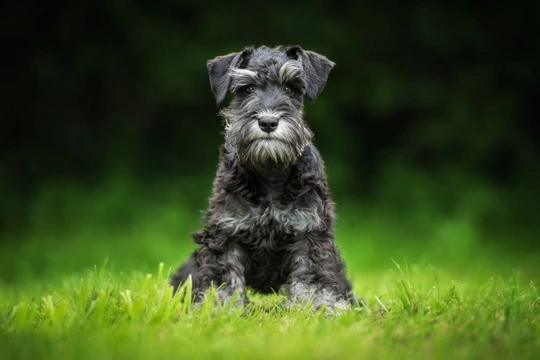
Myotonia congenita DNA testing for the miniature schnauzer dog breed
The miniature schnauzer is the smallest variant of the three different schnauzer dog breeds, and the most recent variant to be recognised as a breed in its own right. Like all of the different sized schnauzer breeds, the miniature schnauzer originated in Germany from working origins, and the original dogs of the breed were used for ratting and pest control, among other uses.
Over time, the wider schnauzer dog type was divided up into miniature, standard and giant, but all three of the breed’s size variants are plucky, bold and generally outgoing dogs that are alert, watchful, and quite lively.
Miniature schnauzers are compact, workmanlike dogs with bags of courage and confident demeanours, and they are recognised in the Kennel Club’s utility grouping, reflecting the fact that although they are small, they are by no means toy dogs!
The miniature schnauzer is the 37th most popular dog breed in the UK overall, and they are highly intelligent, very pleasant to train and generally good with children. Dogs of the breed tend to be healthy and fairly long lived, but as is the case for all of the schnauzer size variants, there are a number of hereditary health issues that have become established within some breed lines over time.
Reducing incidence rates of such conditions in future populations of miniature schnauzers relies upon choosing only unaffected, healthy dogs for use within breeding programmes, which means that all prospective miniature schnauzer breeders are advised to learn about the most common hereditary health conditions that can affect the breed and find out their own dog’s status for them where possible.
For many hereditary health conditions in the miniature schnauzer, DNA testing can be carried out on dogs to find out their status and so, if they will pass such conditions onto their own offspring. One such condition is called myotonia congenita, and this is a pathogenic condition that has a significant impact on affected dogs’ quality of life and lifespan.
In this article we will outline what miniature schnauzer myotonia congenita is, how it is passed on from dog to dog, and how to get a miniature schnauzer DNA tested for the condition. Read on to learn more.
What is miniature schnauzer myotonia congenita?
Myotonia congenita is a hereditary health condition that can affect dogs of the miniature schnauzer breed. It is a pathogenic condition that affects the dog’s skeletal muscles, causing a delay in their relaxation after stimulus or at the end of physical activity. This causes problems including hypertrophy of the skeletal muscles, stiffness and an unusual walking gait, a shortened, hopping gait when running, and problems getting up again after periods of rest.
Myotonia congenita in the miniature schnauzer can also cause other issues including problems swallowing normally, noisy breath sounds, dental defects and a range of other issues too.
How is myotonia congenita passed on through miniature schnauzer breed lines?
Myotonia congenita in the miniature schnauzer is inherited by means of autosomal recessive heredity, and it is the combined set of genes that a dog inherits from both sides of their parentage that dictates their own status. Dogs may be either clear of or affected by myotonia congenita, or they can be a carrier for the condition, which means they may pass on carrier or affected status to their own offspring but will not be affected by the condition themselves.
To find out whether any litter you plan from the mating of any two individual dogs will be affected by myotonia congenita, you first need to know the status of both of their parents. You can then work out the status of their offspring using the following model:
- Two clear parent dogs will have offspring that are also clear.
- Two affected parent dogs will have offspring that are also affected.
- Two carrier parent dogs produce a litter within which each pup has mixed odds for their status, with a 50% chance of also being carriers, a 25% chance of being clear, and a 25% chance of being affected.
- A clear parent and an affected parent will produce a litter of carriers.
- A clear parent and a carrier parent will produce a litter with each pup having 50:50 chances of being clear or a carrier.
- An affected parent and a carrier parent will produce a litter with each pup having 50:50 chances of being affected or a carrier.
How to get a miniature schnauzer tested for myotonia congenita
To find out the status of a miniature schnauzer when it comes to myotonia congenita, you need to have the dog DNA tested. If you intend to use this information as the basis of planning a mating match, the other dog in the match must be tested too.
To get a miniature schnauzer DNA tested for myotonia congenita, you just need to arrange a consult with your local vet, so that they can take a blood sample or cheek swab from your dog. This is then sent off to an approved laboratory for testing, which will then return the result of the dog’s status to their owner.



